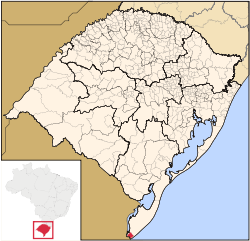Chuí
- For the Chinese weapon, see Chuí (Chinese weapon).
| Municipality of Chuí | |||
|---|---|---|---|
| |||
 | |||
| Coordinates: 33°41′28″S 53°27′24″W / 33.69111°S 53.45667°WCoordinates: 33°41′28″S 53°27′24″W / 33.69111°S 53.45667°W | |||
| Country | Brazil | ||
| Region | Sul | ||
| State | Rio Grande do Sul | ||
| Founded | 1997 | ||
| Government | |||
| • Mayor | Hamilton Silvério Loys (DEM) | ||
| Area | |||
| • Total | 203 km2 (78 sq mi) | ||
| Elevation | 22 m (72 ft) | ||
| Population (2006 est.) | |||
| • Total | 6,605 | ||
| • Density | 32.5/km2 (84/sq mi) | ||
| Time zone | UTC-3 (UTC-3) | ||
| • Summer (DST) | UTC-2 (UTC-2) | ||
| Website | Prefeitura de Chuí | ||
Chuí (Portuguese pronunciation: [ʃuˈi]) is a municipality located in the state of Rio Grande do Sul, Brazil. A border town, it shares its name with sister city Chuy, Uruguay. The two towns constitute one contiguous urban area, divided by a border street called Avenida Internacional, a situation also seen in a few other Brazilian border points, such as between Santana do Livramento (Brazil) and Rivera (Uruguay).
Formerly a village under the jurisdiction of the municipality of Santa Vitória do Palmar, Chuí became the southernmost municipality in Brazil in 1997, when it seceded. It is very close to Brazil's southernmost point, located on a bend of the homonymous river just before its mouth on the Atlantic Ocean, near the hamlet of Barra do Chuí. Both the hamlet and the extreme point itself remained in the territory of Santa Vitória do Palmar after Chuí seceded. Still, Chuí holds the title of the southernmost urban seat of a municipality in Brazil. Its counterparts in the North, West and East are respectively Uiramutã, state of Roraima; Mâncio Lima, Acre; and João Pessoa, Paraíba.
The name "Chuí" (derived from the Arroio Chuí, a small river that runs through the municipality) is mentioned in the widespread Brazilian Portuguese expression "do Oiapoque ao Chuí" ("from the Oiapoque to the Chuí [rivers]"), referring to the fact that the mouths of these rivers are commonly thought to be the country's two extreme points in the North and South. Actually, they are only the extremities of the Brazilian coast. The saying has approximately the same meaning as the American expression "from coast to coast" - i.e., it is used to refer to something that encompasses the whole country.
Chuí has a sizeable community of Palestinian Brazilians.

